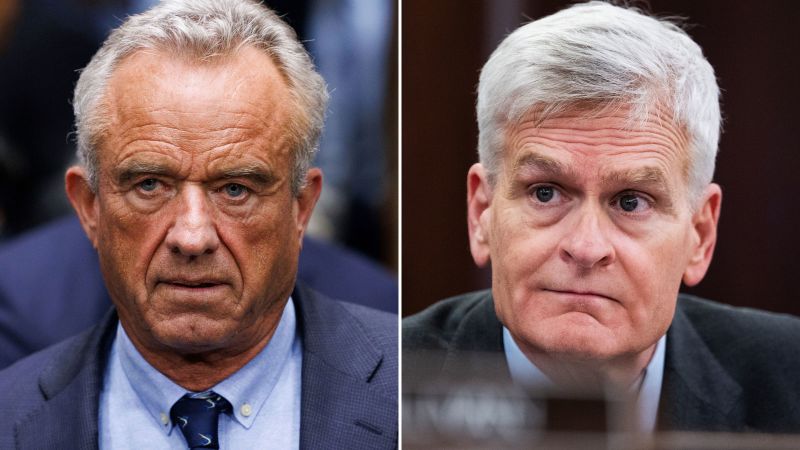The political landscape in America during the Trump era has seen numerous Republicans surrendering their principles to align with the sentiments promoted by Donald Trump. Among them, Louisiana Senator Bill Cassidy stands out as he navigates the delicate balance between party loyalty and evidence-based medical practices. His recent actions, particularly surrounding the confirmation of Robert F. Kennedy Jr. as the Secretary of Health and Human Services, have sparked considerable controversy and may redefine the senator’s political identity.
In February, Cassidy, who chairs the Senate Health, Education, Labor, and Pensions Committee, played a crucial role in endorsing Kennedy despite his well-documented history of spreading vaccine misinformation. This decision seemed contradictory, especially considering Cassidy’s established medical background, having practiced medicine for three decades in which he learned firsthand the importance of vaccinations. Compounding the paradox is the alarming increase in vaccine skepticism within conservative circles, which places Cassidy’s previous convictions at odds with the prevailing trends in his party.
During Kennedy’s confirmation hearing, Cassidy poignantly recounted a transformative moment in his medical career involving an 18-year-old woman suffering from hepatitis B, which he believed could have been prevented through vaccination. “That was an inflection point in my career,” he reflected, indicating a firm belief in the critical role vaccines play in healthcare. Despite this conviction and his hesitations regarding Kennedy’s controversial views on vaccines, Cassidy ultimately cast a pivotal vote for Kennedy, citing a promise that Kennedy would respect existing vaccine safety guidelines and practices.
However, since his confirmation, burdensome questions about the integrity of Kennedy’s commitments have surfaced. Just recently, Kennedy took a unilateral action by disbanding an expert panel tasked with advising the federal government on vaccine recommendations—an action that many observers interpreted as a direct violation of the assurances he had purportedly given Cassidy. Critics have pointed out a concerning trend of Kennedy operating outside the constraints of established protocols, raising alarms about future implications for public health.
Cassidy has been relatively reserved in articulating any regrets regarding his support for Kennedy. Most recently, while addressing inquiries from CNN, he refrained from explicitly stating whether he regretted his decision, despite having previously acknowledged that Kennedy had “lived up to” his commitments. This ambiguous stance suggests that Cassidy might be feeling the political pressure stemming from both his constituents and party affiliations as he approaches reelection in 2026.
Cassidy’s skepticism of Kennedy’s actions reached a boiling point when he took to social media to voice concerns about the direction in which vaccine advisory committees might head under Kennedy. In an X post, he articulated fears that the committee would fill with individuals lacking appropriate expertise regarding vaccinations, a statement underscoring the senator’s broader apprehensive sentiment surrounding public health governance.
Moreover, Cassidy’s proactive engagement reflects a desperate attempt to manage the fallout from his earlier choices. He has previously emphasized that Kennedy bound himself to adhering to established vaccine approval and monitoring frameworks, promising not to destabilize the existing processes. However, newly emerging dynamics indicate that Kennedy has initiated changes regarding vaccine schedules without input from the Advisory Committee on Immunization Practices (ACIP), which Cassidy had previously highlighted as a critical point of congruence in their agreement.
The tension between Cassidy’s medical perspective and Kennedy’s public health policies further unfolded when discussions tied to vaccine safety emerged. Cassidy raised alarms regarding miscommunication and misinformation propagated by Kennedy, particularly as it relates to debunked misconceptions linking vaccines to autism—a narrative Cassidy had condemned in earlier statements. Most recently, Kennedy’s launch of research initiatives to elaborate on the causes of autism seemed to pivot back to the vaccine-autism discourse that has been widely discredited.
As doubts about Kennedy’s commitment to the assurances made to Cassidy grow, the senator’s very public moments of contradiction provide fertile ground for a political reckoning. Cassidy openly criticized Kennedy’s statements, notably during congressional hearings, correcting erroneous proclamations regarding the testing of vaccines, contrasting them with empirical data that refute Kennedy’s claims. This exchange reasserted Cassidy’s professional stance but highlights the precarious situation he faces as both a medical professional and a political actor committed to party loyalties.
Ultimately, Cassidy’s political journey underscores the complexity of navigating an evolving political landscape while trying to remain true to one’s professional convictions. The clash between the realities of public health and party allegiance poses a significant challenge, leaving Cassidy perhaps questioning the implications of his initial decisions regarding Kennedy’s confirmation and what it might mean for his future within the Republican Party.



